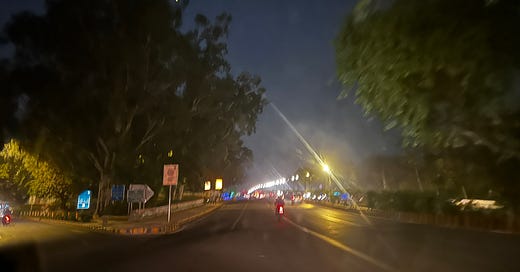Last night I watched a film that has been doing the rounds in film festivals all of last year. Touted, hailed and received as a pathbreaking astounding feature in the barrage of nonsensical things we get to see otherwise these days, the movie was meant to work wonders on the viewers’ minds. It was to act as a cleanser, meant to be seen without handheld modern day devices such as the mobile phone, iPad, etc. It was supposed to make you ponder about the frivolity of everything around us.
And so last night, I turned off the room’s lights and turned on the television, keeping my phone away and the iPad in a different room altogether. The movie opened slowly, as “a-day-in-the-life-of-a-city worker” template unfolded before our eyes. A vision of clean, possibly rain washed, Tokyo as seen from a height, spreading out before us, very early in the morning mesmerised me. The worker gets ready, and steps out of his what seems to be very tiny, working class house.
But before he gets into his van, he peers up above at the sky with a jaunty smile in his face. What is that smile about? Gazing at the sky and feeling overwhelmed with the beauty of nature? Acknowledging the all encompassing nature of, well, nature? Being in the presence of something larger than himself and being wise enough to know that?
There’s no way of knowing because he does this day in and out, every single day of his working life as he leaves from home very early in the morning to go to work. What then happens on the one day off he gets for work? Is he not thankful for “Mother Nature” on that day? Does he fail to acknowledge and register the overwhelming presence of nature around then? Again, there’s no way of knowing.
The day proceeds, slowly, in what looks like again a generic montage shot of a certain someone from a certain background driving to his place work (public toilets), listening to Pale Blue Eyes, Perfect Day and many many such stupendous songs, all the while taking in the “views of the city”. I write some of this in quotes because some of the stuff is so belaboured, heavy handed and overtly emphasised, it feel fraught.
Fraught with meaninglessness, perhaps?
Our protagonist, the worker, is being talked to by his co-worker, pub owners, acquaintances, and many more such people throughout his days and nights. He fails to respond to many of these people. He likes to stay quiet. This made me wonder if it is actually possible in real life at all! As someone who would go lengths to not speak in any situation (work, home, public places, etc.), I’m often made to speak by various external forces that are unknown to me, remain unseen to me.
There’s something highly orchestrated, calcified in the very texture of this film. Something subtly forced, like the director wants to coerce us to “enjoy our lives as much as we can”. There’s a forced gentleness, an underlined sense of loss (of what) and a maturity that everyone should magically reach that course through the movie. I think all of this is in pursuit of the title of the film that begets a certain kind of flawlessness.
My recent Aeonmag essay about home and how where we live makes us who we are: The divided self: does where I live make me who I am?
*****
Some links to terrific reads I stumbled upon these past weeks:




